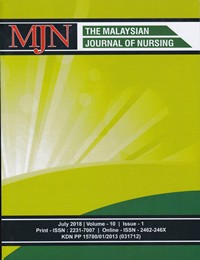
Jurnal
SOCIAL AND CULTURAL ISSUES OF INDONESIAN MIGRANT NURSES IN JAPAN
Cooperation with IENs (Internationally Educated Nurses) is increasingly important given the aging society and low birth rate in Japan. This study focuses on lived experiences of Indonesian nurses in Japan. Objectives of this study were to clarify their experiences and views in terms of the scope of nursing and cultural adaptation, and to examine whether cultural barriers are among the reasons nurses return to their home country. The study was based upon in-depth interviews with Indonesian nurses who had worked in Japan. Fourteen Indonesian nurses participated in the study. Indonesian nurses viewed Japanese work culture as hardworking, requiring excessive punctuality, having too many rules, and maintaining hierarchy between junior and senior nurses. Collaboration with doctors, integrated elderly care, and touching emerged as differences in the nursing practice. Indonesian nurses hesitated to touch patients as they did in Indonesia due to cultural differences. Religious practice among Muslims and family priority were reasons to return to Indonesia. To utilize IEN's skills, not only must the migrants learn Japanese culture and values, but it will be necessary for Japanese employers and staff to understand the values of the IENs.
Availability
No copy data
Detail Information
- Series Title
-
The Malaysian Journal of Nursing, July 2018 Vol. 10 Issue 1
- Call Number
-
(05) 610.5 LIN t
- Publisher
- Malaysia : Lincoln University College., 2012
- Collation
-
Hlm. 49-56
- Language
-
English
- ISBN/ISSN
-
2231-7007
- Classification
-
(05) 610.5 LIN t
- Content Type
-
-
- Media Type
-
-
- Carrier Type
-
-
- Edition
-
Vol. 10 Issue 1
- Subject(s)
- Specific Detail Info
-
-
- Statement of Responsibility
-
-
Other version/related
No other version available
File Attachment
Comments
You must be logged in to post a comment
 Computer Science, Information & General Works
Computer Science, Information & General Works  Philosophy & Psychology
Philosophy & Psychology  Religion
Religion  Social Sciences
Social Sciences  Language
Language  Pure Science
Pure Science  Applied Sciences
Applied Sciences  Art & Recreation
Art & Recreation  Literature
Literature  History & Geography
History & Geography